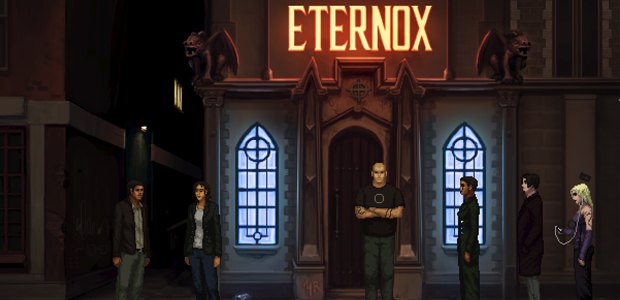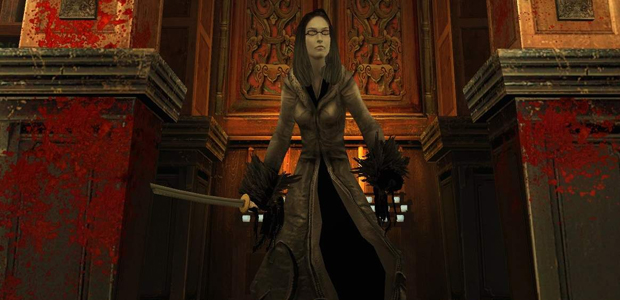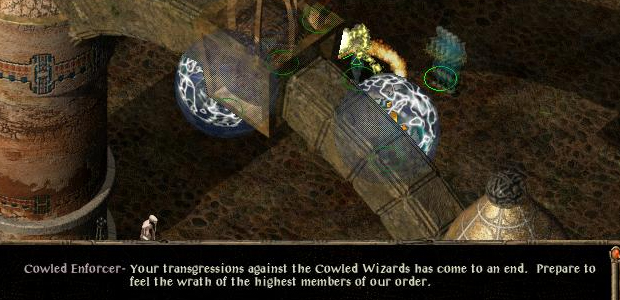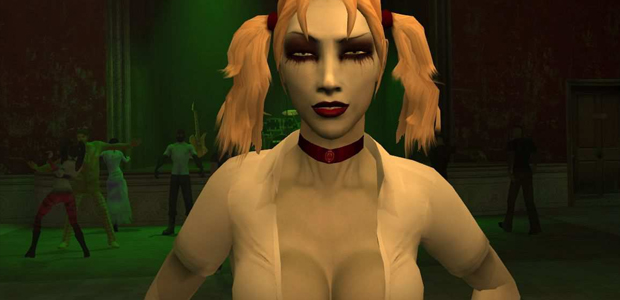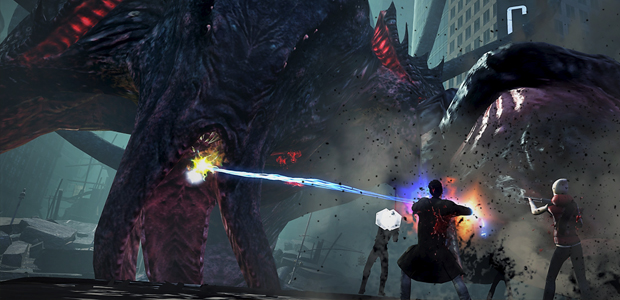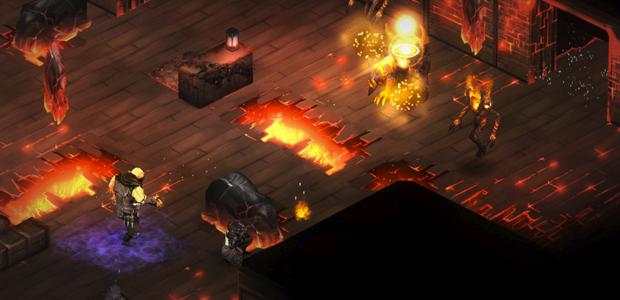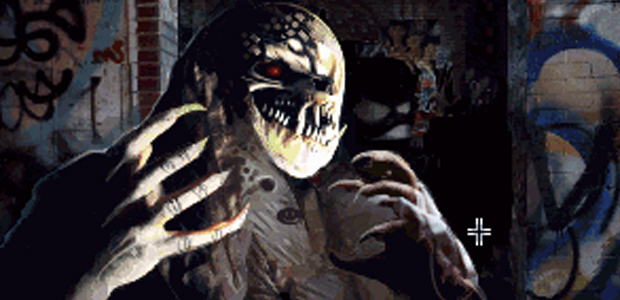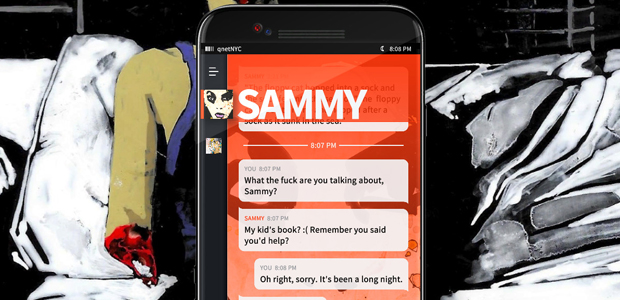The RPG Scrollbars: In search of urban fantasy
World of Absence
There's a real urban fantasy gap in the gaming industry, and it's never made much sense. We see a thousand Tolkienesque fantasy games a minute (rough napkin calculation) and the future's typically so bright, even the lens flares need shades. Yet when it comes to that line where the mundane meets the magical, mostly what we've had for the last few years is false hope. Hope that World of Darkness would bring the complexity of Eve to the mean streets of Chicago or wherever. Hope that the right person with a big chequebook would get hooked on something like The Dresden Files or Hellblazer. Hope that games like The Secret World would lead the way.
So much wasted opportunity, just sitting there and waiting to be seized.
I'm not, of course, saying that we never see games that take our familiar world and go backstage to show us the secret realities of wizards and vampires and the like that really pull the strings. I mentioned one right there in The Secret World, due to be re-released later this month, hopefully with the entire of Tokyo replaced with an apology for the AEGIS system and a voucher for one of those delicious double chocolate gateau slices they do at Patisserie Valerie. World of Darkness kept everyone excited for years, largely on the back of the astonishingly brilliant Vampire: The Masquerade: Bloodlines and its predecessor, Vampire: The Masquerade: The Crap One. Unavowed (pictured above) looks awesome. And of course, outside of PC RPGs, we've had a few high-profile offerings, like the Darkness series and Persona and... Hellgate, maybe? Then a couple of arguables like Vampyr and Call of Cthulhu: Dark Corners Of QA and...
Hmm.
Seriously. Where is the urban fantasy? Think about it. Thematically and mechanically, it's perfect for RPGs. It's the ability to reshape the world while still maintaining the relevance and resonance of exploring real-world locations. (I know I've linked this before, but I still love that The Secret World's Illuminati base is based on an actual New York district.) Even on a purely fictional basis, there's a lure to the concept of seeing the 'real' world, of being one of the chosen few who gets to cut their strings and advance to the next level of understanding. Likewise, power is never more seductive than when we can vicariously enjoy it against familiar backgrounds in which most of us at least would feel distinctly powerless - to show the mugger in the alley who the real monster is, to clutch a nemesis by the heart and squeeze, or to be the one who dares try and be the ray of goodness in an otherwise bleak world.
Vampire: Bloodlines is a masterpiece for many reasons... admittedly, one of them being that some thirteen years later, it's easier to remember the good bits than, say, the sewer level. But it got this. It understood. Like City of Heroes in the same year, it was a game that managed to convey the feeling of being both special from the very start and yet also not remotely special at all. Break this down to pure numbers and you're statistically not really that different from any other low-level character, except that against a world of bums and regular guys on the street, you immediately feel like a force to be recognised. The roleplaying comes naturally, especially when dealing with something like an obstructive cop. Sorry, what's that? Something about your primitive little human laws? Oh, dear, sweet child, did you just make a mistake.
And yet at the same time, you don't get it all your own way. The new wider world is still intimidating and brutal and full of dangers, and you're at best auditioning to be a tiny little cog somewhere in its machine. The dichotomy is delicious, and not something you generally get in traditional fantasy or SF gaming worlds. Urban fantasy protagonists are almost antiheroes by default, outside of the system enough to make their own decisions, while still subject to the consequences and schemes of endlessly more powerful figures. That's exactly the right level of power for drama, for consequence, for threat, and for fragile alliances of outcasts bound together for a cause that might mean the world to them, but is still only a distraction or inconvenience for the true monsters and power-brokers way up the spiked ladder.
But that's only skimming the surface of why the genre is such a good match for RPGs. Another is that in creating urban fantasy worlds, writers have long had to deal with questions that most RPGs historically avoid - the classic being why everyone isn't constantly making a fuss by flinging spells around all the time. I've spoken before of how much I like the Baldur's Gate 2 handling of this, where magic is outlawed in the main city of Athkatla and breaking out the spells in public summons a team of lethal Cowled Wizards to first give you a warning, and then try and take you out.
As a party with a magic user, you're left with three choices - keep your wands in your pants, pay for a magic license, or out-gun the magical fuzz until they accept that you're beyond their power to contain and agree to leave you alone. Generally, the urban fantasy equivalent is some form of World of Darkness' Masquerade - a general agreement to keep things hushed, whether the reason is fear that pissed off regular humans with guns would trounce the magical world (Dresden Files) or that reality itself would go wibbly (Mage) or simply that people aren't very observant if not directly poking into such matters and that it's probably best that continue (Rivers of London).
This alone is a really cool mechanic for games to play with. The Secret World handles it by keeping the main cities free of noticeable trouble, with the conceit being that you're being sent to places that have gone so far off the rails that the 'secret' thing doesn't matter. Just about everyone you meet who has survived has survived because they're already in on it, while those who don't probably aren't going to last that much longer - and if they do tell, then they'll be dealt with. It's simply more important to deal with the end of the world right now. Bloodlines meanwhile keeps track of Masquerade violations, which can range from saying "Hello, I'm a vampire," to simply being seen in public as a Nosferatu. Losing points is liable to spawn vampire hunters, and running out means an instant game over. True, that focus on points does mean that a few individual scenes are oddly low-impact - particularly the one where you meet someone from your former life and nothing ever actually comes of it - but it's something.
That's just one of many rules that urban fantasy has to offer to make basic interactions more interesting. The Dresden Files, for instance, has the Laws of Magic, with one of the biggies being that killing humans with magic is a capital offence, with black magic as a whole banned because it acts like a drug - the more you use it, the more it starts to feel like the answer to any problem. Again, that's a limitation that can both canonically keep things from going crazy in an RPG setting, and add depth to encounters by adding a limiting factor beyond the classic 'good vs evil'. Hellblazer has the fact that it's a rare John Constantine spell that doesn't cause trouble for someone, fairly or otherwise. Most major series have their own specific hooks, and what works to prevent a fictional universe from becoming too crazy to have the resonance that the genre needs to feel right also works hand-in-hand with most of RPGs' sillier issues.
Honestly, the more you explore the genre, the better a fit it becomes. Combat is usually a factor, with urban fantasy heroes typically forming classes by dint of species or magical speciality, with a whole second layer of mundane weapons thrown in. Harry Dresden for instance always carries a firearm, for when out-classed with magic or fighting someone he can't use it against or just generally as an element of surprise in a magical community that tends to be uninterested in such things. However, combat is also usually a last resort or at least less than ideal outcome, which also permits a whole range of RPG skills like stealth and communication and hacking. Exploration gets to take advantage of all the modern niceties. Nobody cares if a vampire takes a subway train or a taxi. (Indeed, in World of Darkness, the canned MMO, this was intended to be a tactical thing - players watching for when opponents were out of town, and knowing that they wouldn't be able to take the train back for another few hours.) This allows for easy moving between locations, or focusing in depth on one, with modern communication systems for missions and contacts and the like.
Oh, and romance? There is no hornier genre than urban fantasy. Just saying.
What makes the lack of modern urban fantasy so odd is that the last few years have seen a bit of a resurgence in one of its sub-genres, cyberpunk. Shadowrun Returns: Dragonfall is a particularly good example, and honestly a game I would likely steal a lot from if given something like the Vampire license - its strong central hub broken up into lots of smaller modules, much like Baldur's Gate's second chapter, strong outcast characters working towards a larger goal under player control, and so on.
But of course, it's only one game. There's also Shadowrun Fails, or whatever that online version was called, and a big stack of other recent games in other genres, ranging from VA-11 HALL-A to Quadrilateral Cowboy to Hard Reset and so on, and of course, Deus Ex: Mankind Divided, and at some point in the future, Cyberpunk 2077. Historically speaking, more than a few games have also openly conflated the two - often, though not always, in the interests of easier-to-create worlds and even easier justifications for open combat - like Dreamweb, and Bloodnet's wastelands full of psycho-bums.
Doesn't this fill the gap I'm looking for? Real cities, real toys, etc?
For me, not really. Cyberpunk definitely offers some of the same appeal as urban fantasy, like the real-world feel of the locations, the modern trappings of advertising and technology and so on, but the vibe of it is very different and I never find that the future resonates as well as the present/almost present. Deus Ex: Human Revolution is right on that edge, being primarily the present day plus a bit. Even the jump to Mankind Divided and its focus on future-problems like augmentation takes it away from being our world. That's not a critical judgement on it, just that resonance thing again. I put it like this - there probably aren't in fact vampires and mages and wraiths and mummies and whatever running around controlling the world, but there definitely aren't street samurai running around Berlin with katanas, and that's ignoring all the stuff with elves and magic spells and the like. Good urban fantasy typically feels plausible and plays within the boundaries of the world, even if the characters find them laughable.
There's just too much potential sitting on the table here to let it go to waste - for it to have been almost fifteen years since the last great example in Vampire: Bloodlines, and for the closest thing to a follow-up, never mind successor, to be a somewhat shaky mobile game (fun first half, then it collapses...). Whether it's in the form of something known, like a World of Darkness or Dresden or Hellblazer, or a brand new IP with all new secrets lurking in the shadows, it doesn't matter. It's about time we were reminded that one of the most exciting worlds to explore and adventure in can be our own.


